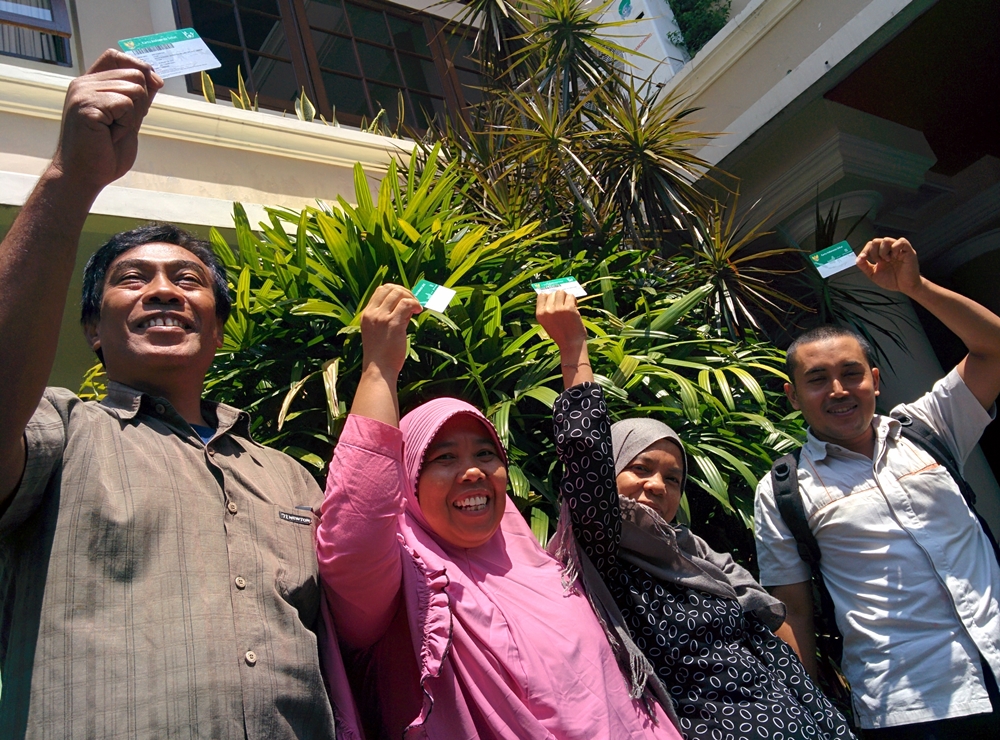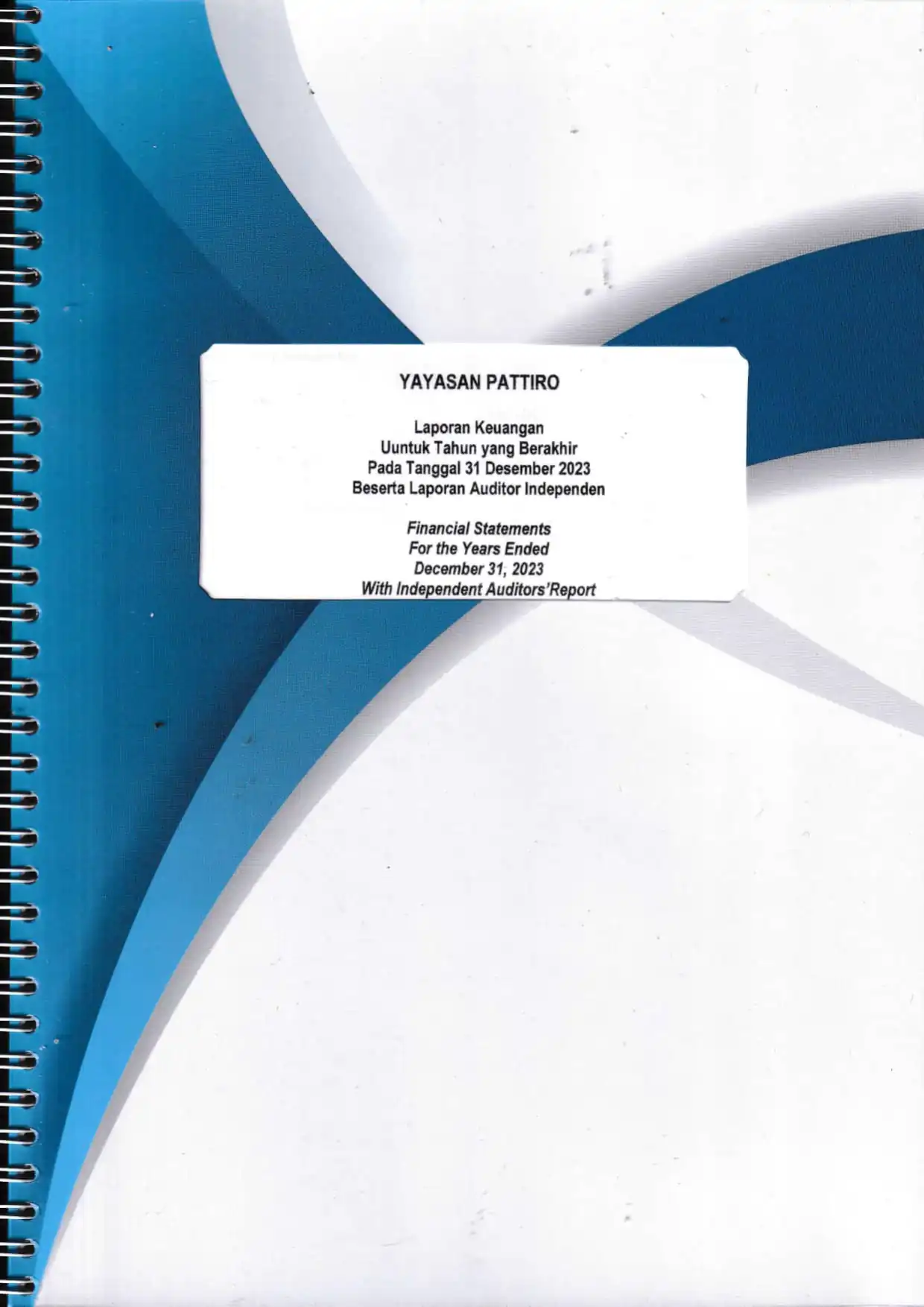
The results of a baseline survey conducted by PATTIRO in September 2015 showed that only 5.6% of disabled people in West Lombok Regency, West Nusa Tenggara Province were registered as participants in the National Health Insurance Program (JKN). This low number is because not many people with disabilities have complete population administration documents. It was noted that only 53% of disabled people there had a National Identity Card (KTP) and only 36% of disabled people had a Family Card (KK).
Seeing this, in October 2015, the PATTIRO Disabled Women Care Program team together with disabled groups who are members of the Labuapi Center for Disabled Potential Development (P3D) and the Mobile Lingsar Group (KLB) also held a meeting with the local health office to convey the findings of the interim survey, especially regarding the lack of access for disabled people to the JKN program which is managed by the Health Social Security Administering Agency (BPJS). At the meeting at that time, the health service asked P3D and KLB activists to propose making BPJS Health cards for people with disabilities through the social service. Unfortunately, at the next meeting with other related agencies, the West Lombok Regency Social Service said that they could not specifically propose that disabled people be included as participants in the JKN program. This is because, based on Government Regulation Number 101 of 2012 concerning Recipients of Health Insurance Contribution Assistance, the people who can be proposed to become JKN Program participants are only poor people who have been included in the 2011 poverty data of the Central Statistics Agency (BPS).
Seeing this small opportunity, PATTIRO and disabled activists in West Lombok Regency held another meeting with the local health office on January 6 2016 to discuss the possibility of using West Lombok Regency Regional Revenue and Expenditure Budget (APBD) funds as a source of financing for disabled participation in the program JKN. The health department also welcomed the proposal. On that occasion, the West Lombok District Health Service said that they were ready to give priority to people with disabilities in obtaining BPJS Health ‘sakti’ cards, especially those with severe disabilities. However, in the process, disabled people must also be willing to follow applicable procedures and fulfill existing requirements, including letters of recommendation from local social services.
Feeling that holding hearings, dialogue forums and lobbying had not produced maximum results, on January 13 and 14 2016, PATTIRO also facilitated disabled activists and groups in holding discussions on strengthening rights and awareness for disabled people and their families. The main topic of this activity was the importance of fulfilling the rights of disabled people to health through their contribution-free participation in BPJS Health. In this series of discussion activities, the participants decided to take collective action in each sub-district in West Lombok Regency which would be facilitated by disabled organizations, P3D Labuapi and KLB.
To realize this collective action, at the two-day meeting, participants also agreed to create two advocacy teams, each consisting of four to five people. The advocacy team from P3D Labuapi consists of Fauzan Nasri as team leader, and Khalid, Marjanah, Budi Santoso, and Jailani as members. The advocacy team from KLB consists of Nurjiah as team leader, and Amirah, Jakranah and Gondrong as members. The advocacy team immediately created an action plan, including plans to socialize and collect population administration documents for people with disabilities and their families, help people with disabilities create population administration documents, coordinate with the village government regarding disability data and information, check disability data held by the village government, carry out coordinating with the Community Health Center (Puskesmas) to obtain a cover letter for making a BPJS Health card, as well as helping people with disabilities process letters of recommendation to the social and employment services, and coordinating with the health service in submitting applications for BPJS Health membership which is free of contributions for people with disabilities.
After the meeting, each team immediately moved to socialize the registration procedures and making BPJS Health cards. At the same time, they collected population administration documents such as KTPs and Family Cards for disabled people and their families. Initially, each team targeted at least 20 to 30 heads of families with disabilities who were willing to register to become BPJS Health participants. Unfortunately, due to limited time, both teams could not achieve this target. However, seeing the high enthusiasm of disabled families to make BPJS Health cards, the team decided to extend the document collection time until January 30 2016. And at that time, the team succeeded in inviting 55 disabled families with a total of 165 people – 22 disabled families or 75 people from Labuapi District and 27 families with disabilities or 90 people from Lingsar District – to collect documents and register as BPJS Health participants in the Free Contribution Participant (PBI) category.
In February 2016, the advocacy team from P3D Labuapi and KLB again held an audience with the health service which was attended directly by the Head of the Health Services Division and the Head of the Health Financing and Insurance Development Division (BPJK)/Social Security Administering Agency (BPJS) West Lombok Regency, representatives disabled groups, and members of the Disabled Women Care Program team. On this occasion, team members conveyed to the participants the progress of the process of collecting population administration documents carried out directly by disabled activists in village fields.
At that meeting, disabled activists and the program team asked the health service for confirmation of the availability of the BPJS Health PBI quota for disabled people. Responding to this question, the Head of the BPJK/BPJS Division also stated that there were still thousands of BPJS Health PBI quotas available, the funds for which came from the West Lombok Regency APBD. Knowing this, disabled activists not only invite and help disabled people, they also encourage other poor people in West Lombok Regency to register as BPJS Health participants in the PBI category. After the meeting was over, it was agreed by the health service that to register for BPJS Health, people with disabilities no longer needed to attach a certificate of incapacity or a certificate from the health center. They only need to attach a photocopy of their KTP and KK to the BPJS Health participant registration form.
After some time being busy with collecting population administration documents which are requirements for BPJS Health registration, on March 3 2016, the PATTIRO Disabled Women Care Program team together with representatives of P3D Labuapi and KLB submitted these documents to the West Lombok District Health Service. On the same day, apart from receiving the documents directly, the Head of the BPJK/BPJS Division immediately verified the documents provided. After the verification process was complete, on March 20 2016, the health service also applied for BPJS Health registration for disabled people and their families. Exactly on April 1 2016, the coveted BPJS Health card finally came out. The advocacy team immediately moved to distribute it to people with disabilities in their work area.
Reflecting on this success, the advocacy team from P3D Labuapi and the Lingsar Bermobil Group plans to collect data again and help people with disabilities and their families to get BPJS Health ‘sakti’ cards. Not only that, the disabled activists will also test access to the facilities provided by health service providers, especially community health centers, to disabled BPJS Health card holders, whether they are in accordance with Minister of Health Regulation Number 28 of 2014 concerning Guidelines for Implementing the JKN Program. This access test will focus on assessing the quality of health aids that health centers provide to people with disabilities, such as prosthetic legs and arms, hearing aids, glasses and crutches, as well as the cataract surgery process. Based on the results of the interim assessment, to date, no community health center in West Lombok Regency has ever provided services for requests for the provision of health aids for people with disabilities.
Author: Nurjanah | Editor: Ega Rosalina




